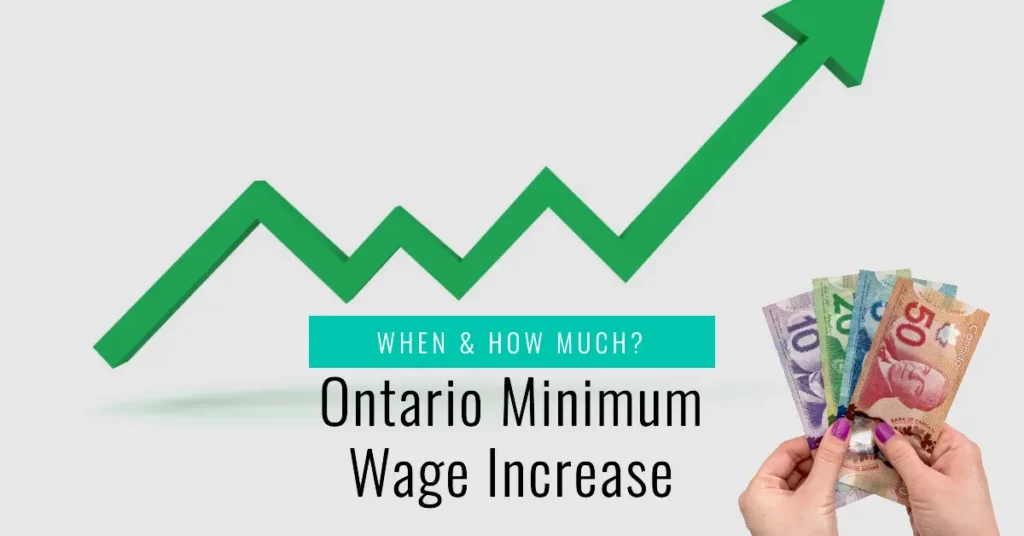Are you wondering about the upcoming Ontario minimum wage increase 2024? If so, you’ve come to the right place! This article will provide you with all the essential information about the new minimum wage, including the effective date and the updated rates for various categories of workers.
Table of Contents
Ontario Minimum Wage Increase 2024
Starting October 1, 2024, the Ontario government will raise the minimum wage from $16.55 per hour to $17.20 per hour. This 3.9% increase is based on the Ontario Consumer Price Index (CPI) and will make Ontario’s minimum wage the second highest in Canada.
The wage adjustment is part of the government’s ongoing effort to ensure that the minimum wage keeps pace with inflation and the rising cost of living. By linking the increase to the CPI, the government aims to provide workers with more financial stability and better purchasing power.
This change reflects the government’s commitment to supporting low-wage workers and addressing income inequality in the province. The increase will benefit thousands of workers across various industries, providing them with a higher income to meet their daily needs.


New Minimum Wage Rates (Effective October 1, 2024)
The table below outlines the new minimum wage rates will take effect as of October1,2024 for different categories of workers in Ontario:
| Worker Category | Current Minimum Wage (as of July 22, 2024) | New Minimum Wage (Effective Oct 1, 2024) | Increase |
|---|---|---|---|
| General Minimum Wage | $16.55 per hour | $17.20 per hour | 3.9% |
| Student Minimum Wage (under 18, working ≤28 hrs/week during school or full-time during breaks) | $15.60 per hour | $16.20 per hour | 3.8% |
| Liquor Servers (certified) | $15.60 per hour | $16.20 per hour | 3.8% |
| Homeworkers | $18.15 per hour | $18.90 per hour | 4.2% |
| Hunting, Fishing and Wilderness Guides | *$86.00 (for under 5 consecutive hours) or $172.05 (for 5+ consecutive hours) | *$89.60 (for under 5 consecutive hours) or $178.26 (for 5+ consecutive hours) | 4.2% |
Note:
- The rates for hunting, fishing, and wilderness guides apply to full-day outings, not hourly wages.
Additional Information:
- The minimum wage for students under 18 working part-time also increased, from $15.60 to $16.20 per hour.
- You can find more details about the Ontario minimum wage increase on the government website
- Canada Minimum Wage: Province-by-Province Breakdown (2024)
When was the last minimum wage increase in Ontario?
The last increase before that was on October 1st, 2023, bringing the minimum wage from $15.50 to $16.55 per hour.
OAS Payment Dates 2024, Increase & More!
CPP & OAS Payment Increase 2024: How Much Is Increase?
Ontario Trillium Benefit 2024 Maximum income Need to Qualify for (OTB) Tax Credits
CPP & OAS Increase 2024: Future Benefits & What to Expect
CPP Payment Dates 2024, Increase, Disability Benefit, CPP Amount & Limit
Ontario Minimum Wage History
You can see an increase in minimum wage throughout the years. There were a few years where the minimum wage remained the same, such as 2011, 2012, and 2013. The most significant increase occurred in 2018, with a jump of $2.40. Ontario Minimum Wage History from the year 1965 to 2024.
| Year | Minimum Wage | Increase from Previous Year |
|---|---|---|
| 1965 | $1.25 | $0.25 |
| 1970 | $1.60 | $0.35 |
| 1975 | $2.35 | $0.75 |
| 1980 | $3.25 | $0.90 |
| 1985 | $3.85 | $0.60 |
| 1990 | $4.50 | $0.65 |
| 1995 | $5.00 | $0.50 |
| 2000 | $6.00 | $1.00 |
| 2005 | $7.00 | $1.00 |
| 2008 | $8.75 | $1.75 |
| 2009 | $9.50 | $0.75 |
| 2010 | $10.25 | $0.75 |
| 2011 | $10.25 | $0.00 |
| 2012 | $10.25 | $0.00 |
| 2013 | $10.25 | $0.00 |
| 2014 | $11.00 | $0.75 |
| 2015 | $11.25 | $0.25 |
| 2016 | $11.40 | $0.15 |
| 2017 | $11.60 | $0.20 |
| 2018 | $14.00 | $2.40 |
| 2019 | $14.00 | $0.00 |
| 2020 | $14.25 | $0.25 |
| 2021 | $14.35 | $0.10 |
| 2022 | $15.50 | $1.15 |
| 2023 | $16.55 | $1.05 |
| 2024 | $17.20 | $0.65 |
The minimum wage increase in Ontario is intended to help workers keep up with the rising cost of living. With the new rates coming into effect on October 1, 2024, minimum wage earners in Ontario can expect a slight boost in their income.









Leave a Reply